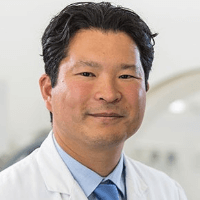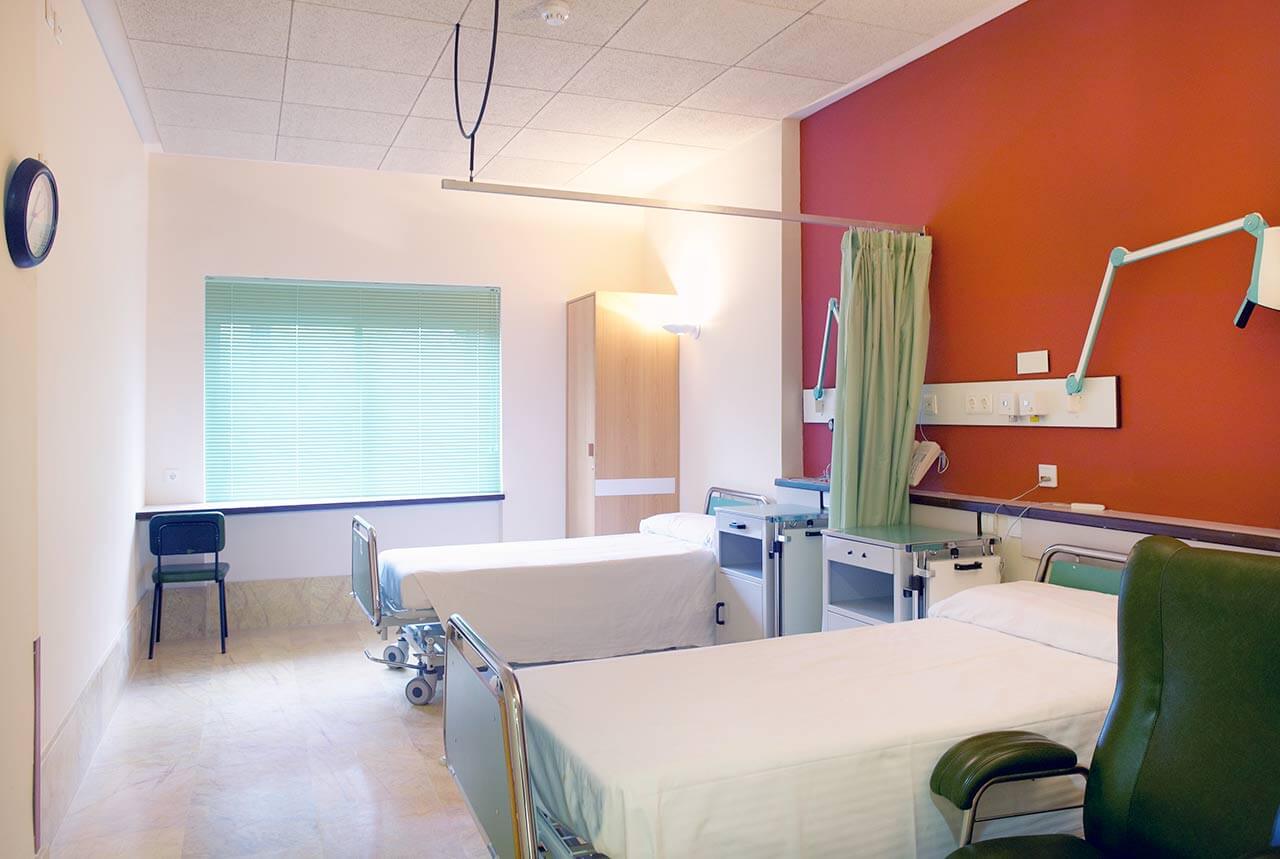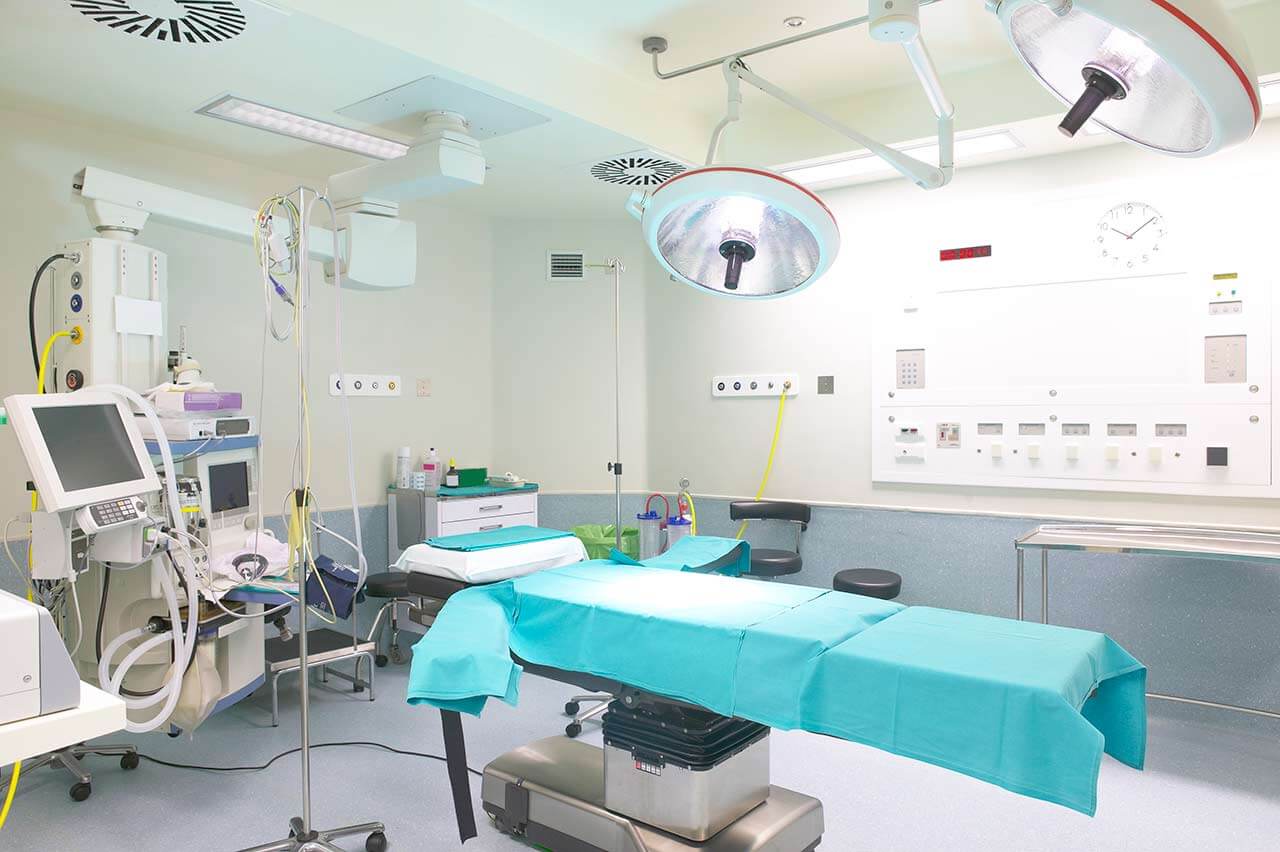
The program includes:
- Initial presentation in the clinic
- clinical history taking
- review of medical records
- physical examination
- laboratory tests:
- complete blood count
- general urine analysis
- biochemical analysis of blood
- inflammation indicators (CRP, ESR)
- indicators blood coagulation
- neurological examination
- CT/MRI scan
- neuropsychological tests (on indications):
- ENMG (electroneuromyography)
- EEG (electroencephalography)
- SEPs (somatosensory evoked potentials)
- VEPs (visually evoked potentials)
- BAEP tests (brainstem auditory evoked potential)
- preoperative care
- neuronavigation-assisted surgical removal
(resection) of astrocytoma - histologically and immunohistochemically
examination of the remote tissues - blood transfusions (if needed)
- 1-day intensive care unit stay
- symptomatic treatment
- control examinations
- the cost of essential medicines and materials
- nursing services
- full hospital accommodation
- explanation of future recommendations
Required documents
- Medical records
- MRI/CT scan (not older than 3 months)
- Biopsy results (if available)
Service
You may also book:
 BookingHealth Price from:
BookingHealth Price from:
About the department
The Department of Adult and Pediatric Neurosurgery, Spinal Surgery at the Hospital Cologne-Merheim specializes in the full range of surgical interventions for diseases, malformations, and injuries of the brain, spinal cord, spine, and peripheral nerves. Surgical procedures are performed in three state-of-the-art operating rooms equipped with navigation systems for the prevention of brain and spinal cord injuries, operating microscopes, an intraoperative X-ray system, electrophysiological monitoring systems, fluorescence navigation devices with 5-aminolevulinic acid, and other necessary medical devices. The department's highly qualified neurosurgeons perform more than 3,100 operations of various complexity every year. Of particular interest is the treatment of patients with brain and spinal cord tumors, vascular malformations, spinal disk herniations, spinal canal stenosis, and spinal stabilization surgery. Innovative stereotactic interventions on the brain are successfully performed in the health facility. The team of surgeons is deservedly proud of their high treatment success rates, while the availability of advanced equipment in the department ensures the highest safety of operations for the patient. Neurologists and neuroradiologists are often involved in the therapeutic process and cooperatively consider complex clinical cases and plan optimal treatment. The Head Physician of the department is Prof. Dr. med. Makoto Nakamura.
The primary focus in the department is the surgical treatment of brain tumors. The neurosurgeons mostly perform surgical procedures for pilocytic astrocytomas, oligodendrogliomas, and glioblastomas. They also have vast experience treating patients with rare brain tumors such as ependymomas, subependymomas, hemangioblastomas, neurocytomas, and epiphyseal tumors. The department also specializes in brain metastasis surgery. In addition, operations on benign skull base tumors, meningiomas, acoustic neuromas, epidermoid cysts, hemangiopericytomas, and pituitary adenomas are successfully performed in the department's operating rooms. Brain surgery is thoroughly planned using computer-assisted equipment. Sparing microsurgical and endoscopic techniques are widely used during interventions. The specialists also use neuronavigation, 5-aminolevulinic acid fluorescence navigation, and intraoperative neurophysiological monitoring to prevent damage to vital brain structures. Surgery for malignant brain tumors is often complemented with conservative treatments such as chemotherapy, radiation therapy, targeted therapy, and other therapies. A treatment regimen for a brain cancer patient is developed during an interdisciplinary tumor board with the participation of neurosurgeons, neurologists, neuroradiologists, oncologists, radiation therapists, plastic surgeons, and ophthalmologists.
The department's special offer is stereotactic and functional neurosurgical interventions. Stereotaxy is a minimally invasive and highly precise therapeutic procedure for treating brain diseases, while functional neurosurgery deals with the restoration of brain functions. This field focuses on the treatment of brain tumors, deep brain stimulation for movement disorders (for example, Parkinson's disease, dystonia, and tremor), deep brain stimulation for treatment-resistant psychiatric disorders (for example, obsessive-compulsive personality disorder and Tourette syndrome), and the treatment of chronic pain and spasticity using neuromodulation and the implantation of drug delivery pumps. Stereotactic surgery allows for a minimally traumatic approach to deep brain regions, enabling treatment for conditions that were previously considered incurable. Stereotactic interventions are performed using micro-instruments according to the coordinates determined by doctors based on CT and MRI scans and neurophysiological monitoring data. This type of surgery is therefore not only highly effective but also characterized by high safety.
An integral part of the department's clinical practice is surgery for neurovascular diseases of the brain and spinal cord, such as brain aneurysms, arteriovenous malformations, dural arteriovenous fistulas, and cavernomas. Clinical cases of patients with the above-mentioned diseases are cooperatively considered by neurosurgeons, neuroradiologists, and neurologists. For example, in cases of detected brain aneurysms, there are several treatment options. Patients may have dynamic monitoring (if the aneurysm is small and does not cause any symptoms and the risk of its rupture is low), minimally traumatic endovascular intervention, and classical brain surgery. The department's neurosurgeons also perform brain aneurysm clipping. During this surgical procedure, doctors approach the artery from the wall of which the aneurysm was formed through a hole in the skull, after which the surgeon clips the neck of the aneurysm with a titanium clip. As a result, the aneurysm is excluded from the blood circulation, its further growth is prevented, and the risk of its rupture is reduced to zero. Clipping is considered a last-line treatment and is indicated for patients with large aneurysms that cannot be treated using endovascular techniques.
The department's range of services is complemented by surgery for degenerative spinal diseases. The department's neurosurgeons pay special attention to the treatment of patients with herniated discs, spinal stenosis, spondylolisthesis, and spondyloarthritis. Spinal disc herniation is the most common pathology in the department's clinical practice, the treatment of which is performed using a microdiscectomy and a laminectomy. During a discectomy, the intervertebral disc is removed partially or totally, relieving pressure on the nerve root and thereby alleviating pain and other symptoms. A microdiscectomy involves the removal of the intervertebral disc or part of it using microscopes and endoscopes. In complex cases, patients may undergo intervertebral disc replacement surgery. Due to the use of minimally traumatic surgical techniques, patients recover quickly and can be discharged within 1-3 days. Follow-up treatment and monitoring are carried out on an outpatient basis. In the postoperative period, patients receive drug therapy, physiotherapeutic procedures, therapeutic exercises, and massage. In some cases, wearing a spinal supporting corset might be required.
The department's main clinical activities include:
- Neurosurgery
- Surgical treatment of malignant brain tumors in adults and children
- Pilocytic astrocytomas
- Oligodendrogliomas
- Glioblastomas
- Ependymomas
- Subependymomas
- Hemangioblastomas
- Neurocytomas
- Malignant epiphyseal tumors
- Surgical treatment of benign brain tumors in adults and children
- Meningiomas
- Acoustic neuromas
- Epidermoid cysts
- Hemangiopericytomas
- Pituitary adenomas
- Surgical treatment of neurovascular diseases in adults and children
- Brain aneurysms
- Arteriovenous malformations
- Dural arteriovenous fistulas
- Cavernomas
- Surgical treatment of traumatic brain lesions in adults and children
- Traumatic brain injuries
- Surgical treatment of malformations of the central nervous system in adults and children
- Hydrocephalus
- Arnold-Chiari malformation
- Syringomyelia
- Surgical treatment of infectious brain lesions in adults and children
- Brain abscess
- Surgical treatment of diseases of the peripheral nervous system in adults and children
- Peripheral nerve compression syndromes
- Carpal tunnel syndrome
- Cubital tunnel syndrome
- Meralgia paresthetica
- Peripheral nerve tumors
- Neuromas
- Neurofibromas
- Peripheral nerve compression syndromes
- Surgical treatment of malignant brain tumors in adults and children
- Spinal surgery
- Surgical treatment of degenerative spinal diseases in adults and children
- Herniated discs
- Spinal stenosis
- Spondylolisthesis
- Spondyloarthritis
- Surgical treatment of spinal injuries in adults and children
- Surgical treatment of infectious spinal lesions in adults and children
- Spondylodiscitis
- Spondylitis
- Surgical treatment of degenerative spinal diseases in adults and children
- Other medical services
Curriculum vitae
Higher Education and Postgraduate Training
- 10.1991 - 05.1998 Medical studies, Goethe University Frankfurt, Hannover Medical School, University College London, and University of Oxford.
- 12.1993 - 05.1998 Scholarship from the German Academic Scholarship Foundation.
- 07.10.1999 Thesis defense in Neuroscience, Goethe University Frankfurt.
- 13.12.2006 Habilitation.
Internships Abroad
- 02.1995 - 03.1995 Department of Orthopedics, Keio University Hospital, Tokyo, Japan.
- 02.1996 - 03.1996 Department of Internal Medicine, Mount Sinai Hospital, New York, USA.
- 03.1996 - 04.1996 Department of Neurology, Beth Israel Deaconess Medical Center, Albert Einstein College of Medicine, New York, USA.
- 07.1996 - 08.1997 Department of Neurosurgery, University Hospital Zurich, Switzerland.
Professional Career
- 10.1998 Internship, Department of Neurosurgery, Nordstadt Hospital Hanover.
- 01.04.2000 Admission to medical practice.
- 04.2000 Assistant Physician, Department of Neurosurgery, Nordstadt Hospital Hanover.
- 29.11.2004 Board certification in Neurosurgery.
- 04.2005 Senior Physician, Department of Neurosurgery, Nordstadt Hospital Hanover.
- 01.01.2006 Senior Physician, Department of Neurosurgery, Hannover Medical School.
- 04.2006 - 06.2016 Representative of the Interdisciplinary Tumor Board at the Neurosurgical Center, Hannover Medical School.
- 11.2008 - 06.2016 Deputy Head and Managing Senior Physician, Department of Neurosurgery, Hannover Medical School.
- 11.2008 - 06.2016 Specialist in advanced training in Neurosurgery, Hannover Medical School.
- Since 01.07.2016 Head Physician, Department of Adult and Pediatric Neurosurgery, Spinal Surgery at the Hospital Cologne-Merheim.
- Since 09.2016 Head of the Department of Neurosurgery at Witten/Herdecke University.
Clinical and Research Interests
- Skull base surgery.
- Brain tumor surgery.
- Minimally invasive and endoscopic interventions on the brain and spine.
- Neurovascular surgery.
Photo of the doctor: (c) Kliniken der Stadt Köln gGmbH
About hospital
According to the reputable Focus magazine, the Hospital Cologne-Merheim ranks among the top German medical centers!
The health facility is an academic hospital of Witten/Herdecke University, which gives patients access to the very latest developments in European medicine. The Hospital Cologne-Merheim positions itself as a maximum care medical center, which is why it offers a wide range of high-quality medical services. The hospital has 752 beds in 13 specialized departments. More than 28,000 inpatients are treated here every year. Outpatient care is also provided for many medical specialties. The hospital also collaborates closely with the University Hospital Cologne, carrying out fruitful work at the Transplant Center.
The most successful areas of clinical practice in the medical center are neurosurgery, pulmonology, transplantology, surgery (in particular, minimally invasive), cardiology, traumatology, joint replacement surgery, and plastic surgery. The Departments of Ophthalmology, Anesthesiology, Radiology, Neuroradiology, and Palliative Care are also distinguished by top-class medical service. In addition, the Departments of Neurology and Neurosurgery provide effective early rehabilitation programs for patients with stroke, traumatic brain injuries, brain tumors, and other neurological diseases. Comprehensive treatment of such a level is available only at highly specialized and best medical facilities in Germany.
The hospital has several ultramodern intensive care units, where patients in critical condition are treated.
It is worth noting that the hospital was the first in the region to be certified in accordance with KTQ® (Cooperation for Transparency and Quality in Health Care). The certification process is repeated every three years, and each time the hospital passes it with excellent results.
The basis for high-quality medical services lies in state-of-the-art equipment, the application of effective and reliable therapeutic methods, and the vast clinical experience and professionalism of doctors and nursing staff. The main value for each employee at the hospital is the patient's health. Doctors devote enough time to personal communication with patients in order to establish a trusting relationship and explain the details of upcoming treatment.
Photo: (с) depositphotos
Accommodation in hospital
Patients rooms
The patients of the Hospital Cologne-Merheim live in single and double rooms. All patient rooms are cozy and designed in light colors. Each patient room has an ensuite bathroom with a shower and a toilet. The furnishings of a standard patient room include an automatically adjustable bed, a bedside table with a pull-out tray, a wardrobe for personal belongings, a table and chairs for receiving visitors, a TV, and a telephone. Wi-Fi is also available in the patient rooms.
If desired, patients may stay in an enhanced-comfort room, which additionally provides a safe, a mini-fridge, and upholstered furniture.
Meals and Menus
The patients are offered three tasty and healthy meals a day: breakfast, lunch, and dinner. Breakfast and dinner are served as buffets, and for lunch, there is a set of three menus to choose from.
If, for some reason, you do not eat all the foods, you will be offered an individual menu. Please inform the medical staff about your dietary preferences prior to treatment.
Further details
Standard rooms include:
Religion
There is a chapel on the territory of the hospital, where Catholic and Evangelical worship is regularly held on Sundays and religious holidays. The chapel is also open daily for visits and solitude for prayers.
The services of representatives of other religions are available upon request.
Accompanying person
Your accompanying person may stay with you in your patient room or at the hotel of your choice during the inpatient program.
Hotel
You may stay at the hotel of your choice during the outpatient program. Our managers will support you for selecting the best option.




